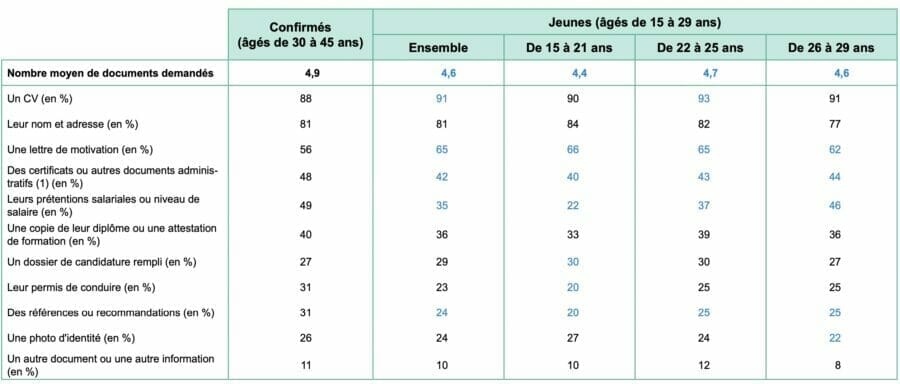According to a survey carried out by the Ministry of Labor, in recent years, 36% of young people had no professional experience before entering the world of work. What are the criteria sought during recruitment? How to put yourself forward without experience? We answer all your questions.
Darès is the statistical department of the Ministry of Labor. The latter has just published a survey carried out based on nearly 6,600 recruitments to find out more about companies’ expectations, particularly with regard to junior profiles. When entering the job market, 36% of candidates aged 15 to 29 had no professional experience.
Today, if you do not follow your work-study course, you may only enter professional life with 6 months of experience. You can boost your CV with a gap allowing you to do fixed-term contracts and other internships, but this is sometimes too little for some companies.
Documents requested during recruitment
Before discussing the important criteria that you must put forward during your interviews, let’s take a look at the documents requested and which must absolutely be provided if you wish to pass the famous screenings. According to Darès, we find companies above all asking for essentials such as the CV (in 91% of recruitments), the name and address (81%) or even the famous cover letter. On the other hand, the investigation by the Ministry of Labor seems to confirm the abandonment of this document which is only requested in 65% of cases.
The study carried out by Darès highlights other interesting documents, such as salary expectations (35%), a copy of the diploma (36%), the driving license (23%) or even an identity photo ( 24%). This last point is surprising since anonymized CVs are now authorized.


Obviously, these documents are not the same depending on the age group. While salary expectations are less important among 15-21 year olds, they are much more in demand among 26-29 year olds (46% compared to 22% for the youngest). Indeed, this generation is generally more educated and therefore more attentive to this criterion.
What criteria do companies look for in a candidate with no experience?

So, what should you do if you have little or no experience, but still want to get the job of your dreams? First of all, there is one very important thing to note. In certain professions, your professional background may be less important, provided that you have professional experience in the sector or profession in which you wish to enter.
However, if you do not have an internship to highlight during your interview, here are the elements that interest recruiters and that you can highlight:
- Motivation (24.2%): the motivation you demonstrate in an interview, your values, your commitment
- Skills (20.8%): your know-how, your abilities developed during your studies
- Availability (21.7%): the date you are available, the type of contract, your punctuality
- Presentation (14.1%): your ability to present yourself, the way you express yourself, your politeness, your smile
- Training (12.6%): your diploma, the languages you master, your background, etc.
- Dynamism (8.7%): your ability to learn, to evolve, your responsiveness and your listening skills
Other elements are also taken into account by recruiters, but are less important for junior profiles. On the other hand, Darès notes that these criteria are much more sought after in confirmed candidates, such as interpersonal skills, efficiency or even suitability for a position.
The path to employment
The Darès survey also highlights how young graduates have found their jobs in recent years. According to this study by the Ministry of Labor, the network should not be neglected. In fact, it enabled 25% of 15-29 year olds to get off to a good start in working life. It is therefore important to master the art of networking and take care of your relationships.
The practice of spontaneous applications still has a bright future ahead of it since it has enabled 23% of young people to find a job. It is important to note, however, that this method mainly favors those looking for less qualified jobs and works very well for student jobs, in particular. The share of those who attempted the spontaneous application is 33% among 15-21 year olds and 17% among 26-29 year olds.
Announcements and trade shows have been grouped into one category. Here again, young people with more qualifications more often use these systems to enter the world of work. 19% of 15-29 year olds find their job this way.
Finally, according to the Daresother minority criteria allow young graduates to obtain employment, such as public or private intermediaries, such as Pôle Emploi, local missions, schools and universities, recruitment firms or APEC. Some consult CV databases and others are called back by their former company or continue their internship on a permanent or fixed-term contract.







